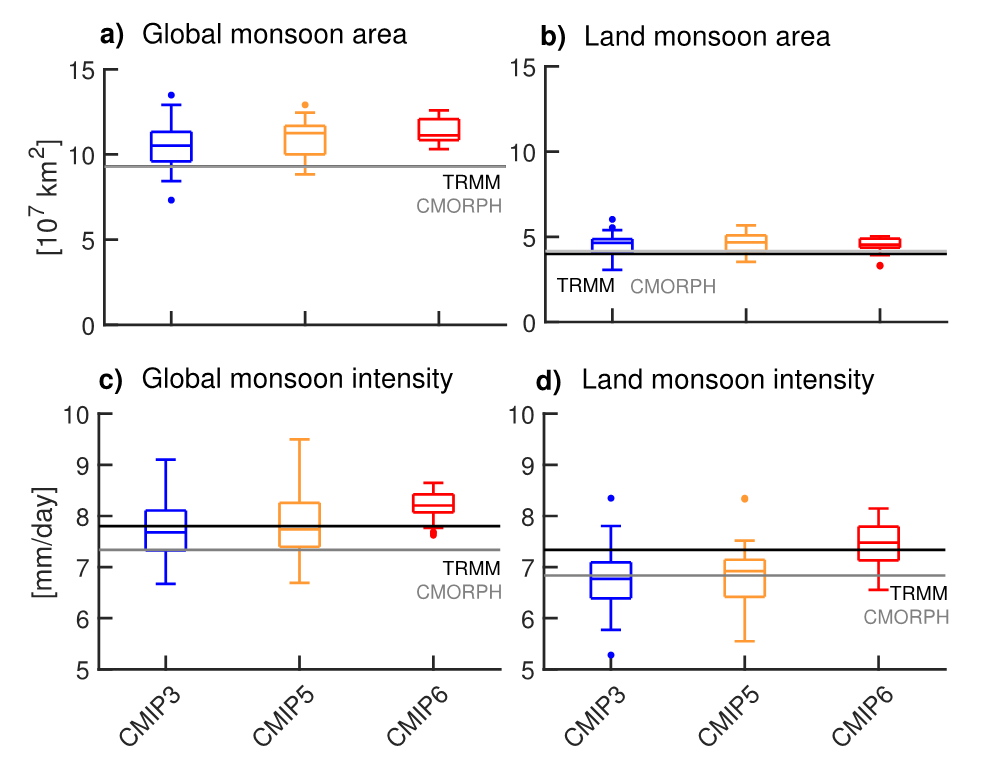Substantial biases persist in CMIP6 simulations of tropical precipitation
The study distinguishes from past studies, both by the incorporation of the CMIP6 models, but also through the breadth of metrics it applied to the evaluation of the representation of tropical precipitation by CMIP models. These metrics demonstrate that while improvements in the simulations can be identified in some metrics, in many metrics there has been little improvement, and in some metrics errors have even increased.
The latest generation of models better represent modes of internal variability, but biases remain for forced (diurnal and seasonal) variability, and have even increased for some other metrics. More specifically the authors show that improvements are found in the (1) tropical mean spatial correlations and the root mean square error of the climatology of tropical precipitation, (2) day-to-day variability and the number of consecutive dry days, (3) dominant modes of internal variability measured by the Madden-Julian Oscillation (MJO) and the El Niño Southern Oscillation, and (4) trends in dry extremes in the 20th century. No clear improvements in CMIP6 are found with respect to (1) the seasonal cycle, still revealing a double Inter-Tropical Convergence Zone, (2) the precipitation associated with convective cloud regimes, (3) the time of occurrence of diurnal maxima, and (4) the persistent negative trends in wet extremes across all CMIPs, representing an opposite trend that is observed. With respect to the monsoon, CMIP6 even reveals greater deviations from the observations than the preceding CMIP phases.
Even in those metrics where the CMIP6 models better represent the observations as compared to previous phases of CMIP, the rate of improvement is slow. For instance, the strength of eastward propagating information associated with the MJO has been substantially improved. But even if one assumes that the current rate of progress can be maintained, another two CMIP phases will pass before we match the simulated MJO to within observational uncertainty. For other quantities the time-scale of model improvement appears even longer. For instance, biases in the mean climatology are still several times larger than the signals projected in association with a roughly 2°C warming.
Given the interest in using the CMIP models to project the response of tropical precipitation to anthropogenic forcing, biases to known and strong forcings, i.e. the seasonal and diurnal cycles, are discouraging. Even where improvements are identified they are small. This slow rate of progress challenges the assumption that further development of models in the framework of CMIP is attuned to the challenges climate change poses for society. The authors conclude that a course correction is warranted, and that future efforts should focus on the development of a new generation of models which no longer require precipitating systems in the tropics to be parameterized, but can rather treat their transient dynamics explicitly and physically and in harmony with other scales of motion.

Original publication:
Fiedler, S., Crueger, T., D'Agostino, R., Peters, K., Becker, T., Leutwyler, D., Paccini, L., Burdanowitz, J., Buehler, S., Uribe, A., Dauhut, T., Dommenget, D., Fraedrich, K., Jungandreas, L., Maher, N., Naumann, A., Rugenstein, M., Sakradzija, M., Schmidt, H., Sielmann, F., Stephan, C., Timmreck, C., Zhu , X. & Stevens, B., 2020: Simulated tropical precipitation assessed across three major phases of the Coupled Model Intercomparison Project (CMIP). Monthly Weather Review, 148, 3653-3680. doi:10.1175/MWR-D-19-0404.1.
This work was carried out in support of the EU CONSTRAIN project.
Contact:
Dr Traute Crueger
Max Planck Institute for Meteorology
Phone: +49 40 41173 105
Email: traute.crueger@mpimet.mpg.de
Prof Dr Stephanie Fiedler
University of Cologne
Institute of Geophysics and Meteorology
Phone: +49 221 470 3693
Email: stephanie.fiedler@uni-koeln.de
